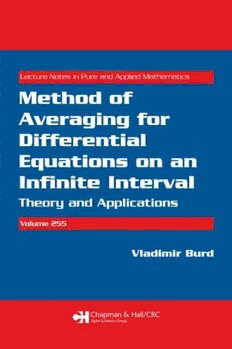Download Method of Averaging for Differential Equations on an Infinite Interval: Theory and Applications PDF Free - Full Version
Download Method of Averaging for Differential Equations on an Infinite Interval: Theory and Applications by Vladimir Burd in PDF format completely FREE. No registration required, no payment needed. Get instant access to this valuable resource on PDFdrive.to!
About Method of Averaging for Differential Equations on an Infinite Interval: Theory and Applications
In recent years, mathematicians have detailed simpler proofs of known theorems, have identified new applications of the method of averaging, and have obtained many new results of these applications. Encompassing these novel aspects, Method of Averaging of the Infinite Interval: Theory and Applications rigorously explains the modern theory of the method of averaging and provides a solid understanding of the results obtained when applying this theory.The book starts with the less complicated theory of averaging linear differential equations (LDEs), focusing on almost periodic functions. It describes stability theory and Shtokalo's method, and examines various applications, including parametric resonance and the construction of asymptotics. After establishing this foundation, the author goes on to explore nonlinear equations. He studies standard form systems in which the right-hand side of a system is proportional to a small parameter and proves theorems similar to Banfi's theorem. The final chapters are devoted to systems with a rapidly rotating phase.Covering an important asymptotic method of differential equations, this book provides a thorough understanding of the method of averaging theory and its resulting applications.
Detailed Information
| Author: | Vladimir Burd |
|---|---|
| Publication Year: | 2007 |
| ISBN: | 9781584888758 |
| Pages: | 356 |
| Language: | English |
| File Size: | 1.617 |
| Format: | |
| Price: | FREE |
Safe & Secure Download - No registration required
Why Choose PDFdrive for Your Free Method of Averaging for Differential Equations on an Infinite Interval: Theory and Applications Download?
- 100% Free: No hidden fees or subscriptions required for one book every day.
- No Registration: Immediate access is available without creating accounts for one book every day.
- Safe and Secure: Clean downloads without malware or viruses
- Multiple Formats: PDF, MOBI, Mpub,... optimized for all devices
- Educational Resource: Supporting knowledge sharing and learning
Frequently Asked Questions
Is it really free to download Method of Averaging for Differential Equations on an Infinite Interval: Theory and Applications PDF?
Yes, on https://PDFdrive.to you can download Method of Averaging for Differential Equations on an Infinite Interval: Theory and Applications by Vladimir Burd completely free. We don't require any payment, subscription, or registration to access this PDF file. For 3 books every day.
How can I read Method of Averaging for Differential Equations on an Infinite Interval: Theory and Applications on my mobile device?
After downloading Method of Averaging for Differential Equations on an Infinite Interval: Theory and Applications PDF, you can open it with any PDF reader app on your phone or tablet. We recommend using Adobe Acrobat Reader, Apple Books, or Google Play Books for the best reading experience.
Is this the full version of Method of Averaging for Differential Equations on an Infinite Interval: Theory and Applications?
Yes, this is the complete PDF version of Method of Averaging for Differential Equations on an Infinite Interval: Theory and Applications by Vladimir Burd. You will be able to read the entire content as in the printed version without missing any pages.
Is it legal to download Method of Averaging for Differential Equations on an Infinite Interval: Theory and Applications PDF for free?
https://PDFdrive.to provides links to free educational resources available online. We do not store any files on our servers. Please be aware of copyright laws in your country before downloading.
The materials shared are intended for research, educational, and personal use in accordance with fair use principles.

